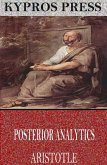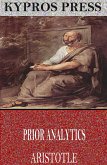Aristotle's "Posterior Analytics" is a cornerstone of epistemology and scientific methodology, delving into the nature of knowledge and the principles of demonstration. Through a rigorous exploration of syllogistic reasoning, Aristotle outlines the foundational elements of scientific knowledge, distinguishing between what is known and how it is known. His analytical style reflects the systematic clarity typical of his works, embodying the transition from pre-Socratic inquiry to a more formalized study of logic and science. Set against the backdrop of the philosophical inquiries of Classical Greece, this text not only elucidates the mechanisms of deducing knowledge but also establishes a dialectic framework for understanding empirical evidence and causation. Aristotle, born in 384 BCE, was a polymath whose extensive inquiries spanned numerous subjects, including ethics, politics, and biology. The intellectual milieu of his time, marked by a burgeoning quest for rational explanation, undoubtedly influenced his writing of "Posterior Analytics." His mentorship under Plato tempered by his later critiques of Platonic ideals informs his inquiries into the nature of demonstrable knowledge. Coupled with his empirical observations, these experiences coalesce into a profound analysis of how knowledge can be attained and validated. For scholars and students both familiar and unfamiliar with Aristotelian thought, "Posterior Analytics" stands as an essential text for understanding the development of scientific reasoning. It invites readers into a dialogue about the nature of knowledge, prompting them to consider not just the conclusions we reach, but the methodologies used to arrive at those conclusions. Engaging with this work will enhance one's appreciation for the philosophical foundations that underpin science and logic today.
Dieser Download kann aus rechtlichen Gründen nur mit Rechnungsadresse in A, B, BG, CY, CZ, D, DK, EW, E, FIN, F, GR, H, IRL, I, LT, L, LR, M, NL, PL, P, R, S, SLO, SK ausgeliefert werden.









